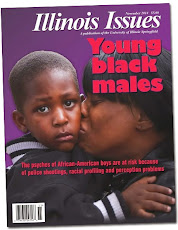By Jamey Dunn
Gov. Pat Quinn proposed to increase the state income tax by 1 percentage point during his budget address today, saying the money would be needed to stave off drastic cuts to education.
Quinn said federal stimulus funds protected education from serious cuts this fiscal year, but with the end of about $1 billion of stimulus funds to education, a proposed cut of $1.3 billion will be necessary. Quinn’s logic is that the state does not have the money to shift from some other area to replace the federal funds.
By proposing either drastic cuts or a tax increase, which he called a “surcharge for education,” Quinn appears to be trying to force legislators to make a politically difficult choice between higher taxes or deep cuts to schools.
“I am making this cut [to education] with the greatest of reluctance and only because our current fiscal emergency leaves me no choice. These cuts are unavoidable. They’re the consequence of a bipartisan refusal year after year to confront fiscal reality,” Quinn said.
According to Quinn’s budget director, David Vaught, the increase would raise the personal income tax from 3 percent to 4 percent and the corporate from 4.8 percent to 5.8 percent. He said it would generate an estimated $2.8 billion, which Quinn intends to spend wholly on education. Vaught added it would defer cuts, as well as pay down overdue bills that Illinois owes to schools.
Last year, Quinn proposed an income tax increase that would have raised the rate to 4.5 percent for individuals and 7.2 percent for businesses.
This would be a smaller increase, and Quinn has given legislators some political cover: They could claim they were supporting education with a “yes” vote. However, this tax increase does not appear to be starting off with any more support than last year’s proposal.
Republicans said the differences between the governor’s budget this year and last year are not big enough.
“What’s disappointing is, he essentially proposes to do the same things as he did last year. Proposed cuts that we know he’s not going to make … record borrowing or a tax increase and no reform to the system … to the government that is fundamentally broken,” Sen. Matt Murphy, a Palatine Republican.
Senate President John Cullerton said he would support Quinn’s tax increase, but because the Senate passed a tax increase last session, the effort would have to start in the House.
“The Republicans in the House … along with the Democrats have to take this issue up and lead the way, and the Senate will certainly follow. … It’s clearly now focused on education and avoiding draconian cuts to education,” he said.
Cullerton added he would support a temporary income tax increase, “so we can address this crisis that we have right now, the worst economic crisis in our lifetime.” But, he reiterated that the details would have to be mapped out in the House.
House Speaker Michael Madigan does not appear optimistic about the increase passing in his chamber. “[Quinn] called upon every member of the General Assembly to help him solve a severe budgetary problem. I sincerely hope that every member is prepared to cooperate; every member is prepared to do some heavy lifting. I have my doubts,” Madigan said today on the Illinois Lawmakers television program.
Cullerton said he plans to sponsor legislation to reform the state’s pension system, something that Republicans have been demanding before they would consider a tax increase. House Minority Leader Tom Cross said it will take more than that to get Republican votes on a tax increase.
Cross said he wants to see “fundamental reforms” to state government. He added that Republicans will have to invited to the bargaining table. He said they were cut out of the budget process last year.
“We’ve gone down this road with this guy before. A year ago, we were going to decimate the human services budget and the developmentally disabled community. It didn’t happen. Six months ago, we were going to take away and annihilate the map program for college kids. It didn’t happen,” Cross said. “This is a fellow and an individual and a politician that likes to hold people hostage. Last year, it was college kids and the developmentally disabled community. This year, it is K-12.”
Cross characterized Quinn’s proposal as purely political threats. “I would suggest to you at the end of the day this isn’t going to happen. … This is a scare tactic.”
Quinn’s Republican opponent for governor, Sen. Bill Brady, continues to stand by his plan to cut spending by 10 percent across the board. Brady, a Bloomington Republican, was critical of Quinn for proposing such a large cut to education. "It was ironic to me that Quinn didn't think 17 percent cuts to education were draconian," he said.
Brady added that his plan would more fairly spread cuts over all areas of government.
"I wouldn’t attack one area of state spending, like education. He attacked education, leaving other areas, in fact increasing Medicaid funding by over $500 million at the expense of our school children. I’ve said there has to be a shared responsibility in this solution.”
In his address, Quinn called across-the-board cuts, such as those Brady is proposing, “heartless and naïve.”




